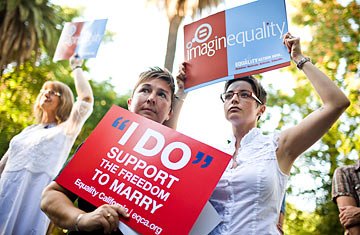
Marci Burba, center, and her wife Kelly McAllister, right, celebrate the anniversary of their wedding and that of the California Supreme Court ruling allowing same-sex marriages in Sacramento on June 17, 2009; the ruling, which occurred in June 2008, was overturned in November 2008
(2 of 2)
Next the question would be whether banning gay marriage achieves a legitimate government interest — and defenders of Prop 8 included more than a dozen such goals in a preview of their case filed last month. They argue that allowing same-sex marriage would weaken society and erode support for traditional marriage. They also say that it could lead to greater acceptability, and eventually legal recognition, of polygamy and marginalize the role of biological parents.
Some state courts have found that laws forbidding gay marriage achieve no legitimate interest at all. And others have ruled that while same-sex marriage bans may be rational, they can't survive a higher scrutiny that courts reserve for special classes of citizens — such as racial minorities and, on a more limited basis, women. No federal appeals court has so far held that gays and lesbians as a class are entitled to the special protection that requires heightened scrutiny of laws that discriminate on the basis of race or religion, for example. That may sound like a fine legal distinction, but it is one that matters. For instance, laws that deny a fundamental right to a group based on race are subject to the highest level of scrutiny, and almost always fail a constitutional test. But the same law, if applied to a group without such constitutional protection, can usually survive, like laws that prevent felons from voting.
Both sides have announced plans to call experts from top universities around the world to testify about whether gays are politically powerless and a handful of other specific tests that form the basis of the law governing claims under the due-process and equal-protection claims of the U.S. Constitution.
"Many people might be surprised to know that key issues about the legal status of gay people remain undecided in federal law," Jennifer Pizer, director of the National Marriage Project for Lambda Legal, told TIME. "Do all people have the same right to marry regardless of sexual orientation? ... Should sexual-orientation discrimination be considered a form of sex or gender discrimination? Judge Walker may decide some or all of these questions, and the Ninth Circuit may decide them differently. Whatever happens is likely to have great significance."
Defenders of Prop 8 say that laws reserving marriage for heterosexual couples don't discriminate against gays — instead they say they simply emphasize the meaning that the word marriage has had throughout history, a meaning they say wasn't seriously questioned until the past 10 years. "Save for a few brief months between the California Supreme Court's decision ... and the adoption of Proposition 8, California has from its inception always limited marriage to the union of a man and a woman," wrote Charles Cooper, who served in the Reagan Administration's Justice Department with Olson, in his trial brief Dec. 7. "Indeed, until this decade, every State, nation and civilized society in every period of history had always limited marriage to opposite-sex relationships ... Contrary to Plaintiffs' contentions, the traditional definition of marriage does not reflect animus against gays and lesbians — in California or anywhere else."
Pizer says groups like hers had argued against testing these issues now in federal court, but have since helped with trial preparation. "We very much hope that Ted [Olson] is right that he has the votes to prevail against Prop 8, whether or not new constitutional ground is broken and regardless of which appellate court has the final word in the [San Francisco] case. And we've been doing everything we can to help the trial team prepare, as we're all passionately committed to victory both in this case and in the longer-term, national struggle."
No matter what happens, though, the issue of gay marriage won't be decided for good, no matter how far up the line this case goes. Gay marriage is legal in five states, and no decision by the U.S. high court would preclude other states from expanding those ranks. "It is definitely true that the case (even if unsuccessful) would not sound the death knell for same-sex marriage," Marcosson says. "States are permitted to do things that they are not required to do by the federal Constitution."
But for now the attention will be on San Francisco, where Olson and Boies are rolling the constitutional dice. Olson told TIME he's ready to go. "On more than one occasion I've been told that I had no chance to win a case," he says. "While one doesn't ignore these scholarly prognostications, I've found that they can often be wrong."
